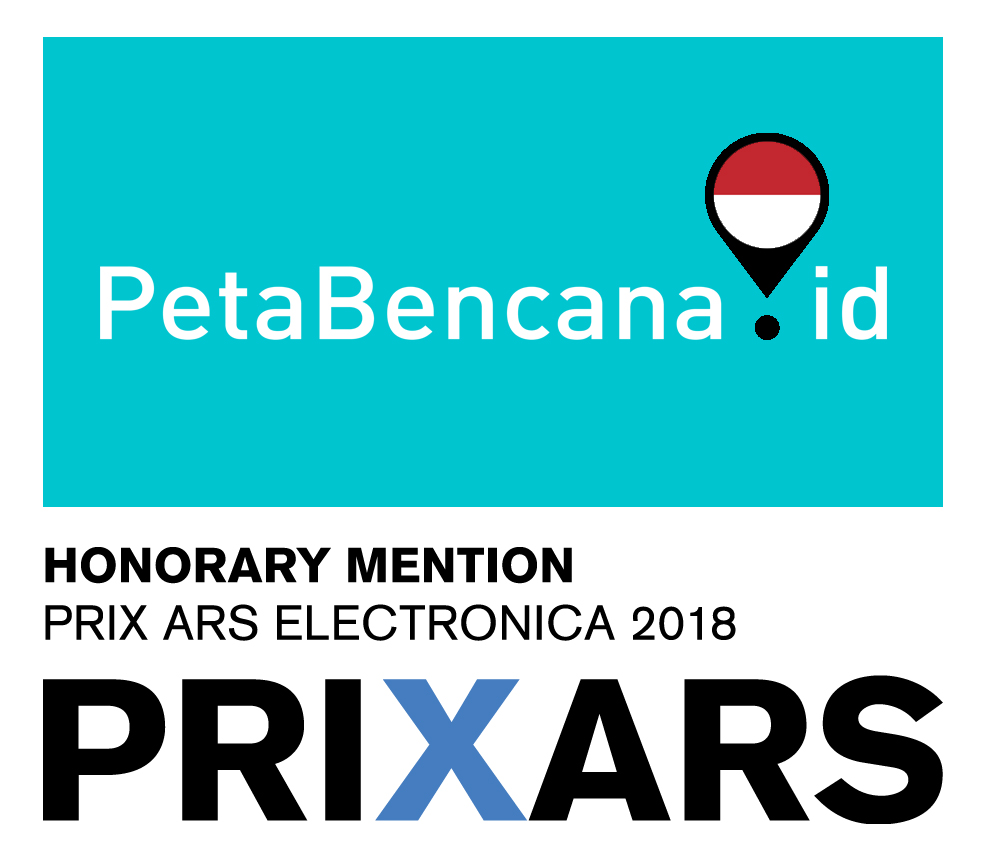
![]() PetaBencana.id is recognized by Ars Electronica for demonstrating the latest developments in social software, building community action and interaction, strengthening the role and ability for civic participation, and promoting social innovation as well as cultural and environmental sustainability through internet technology.
PetaBencana.id is recognized by Ars Electronica for demonstrating the latest developments in social software, building community action and interaction, strengthening the role and ability for civic participation, and promoting social innovation as well as cultural and environmental sustainability through internet technology. ![]()
On June 11th, 2018 Ars Electronica announced the winners of the 2018 Prix Ars Electronica competition, awarding PetaBencana.id with an honorary mention.
Recognized as the “world’s most time-honored media arts competition”, the Prix Ars Electronica was launched in 1987 by Ars Electronica co-founder Hannes Leopoldseder. The prize awards projects displaying excellence in seven categories: Computer Animation, Interactive Art, Digital Communities, Digital Musics and Sound Art, Hybrid Art, and u-19 Create Your World (a category for kids up to age 19). Previous winners of the prestigious prize have included Pixar in 1987, Wikipedia in 2004, and Wikileaks in 2009.
This year 3,046 entries from 85 countries were submitted for the Prix Ars Electronica Prize. PetaBencana.id was one among 12 projects that received honorable mentions for the Digital Communities category. ‘Digital Communities’ recognizes projects that demonstrate the latest developments in social software, build community action and interaction, strengthen the role and ability for civic participation, and promote social innovation as well as cultural and environmental sustainability through internet technology.
PetaBencana.id is a free and open source platform for crowd-sourced flood reporting in Indonesia. The platform gathers confirmed reports of flooding from various social media channels and visualizes them on a free web-based map in real-time. In order to filter through the noise of social media the software listens for specific keywords in social media posts (such as “flood”) and deploys a “humanitarian chatbot” that initiates AI-assisted conversations with residents to collect verified disaster reports. These reports are displayed on a free public map in real-time, alongside relevant emergency data issued by local agencies. Emergency managers monitor the platform to assess the situation, respond to resident needs, and, as part of a transparent two-way communication system, update the map with time-critical information to alert residents to flood in their neighbourhood. The publicly available map is used by residents, government officials, and first responders to stay informed about changing flood conditions across the country, in order to prepare for and respond to emergency events. Since its debut in 2014 the platform has been used by over half a million residents during monsoon flooding.
PetaBencana.id has proven that community-led data collection and visualization reduces disaster risk, increases emergency response times, and assists in relief efforts. Currently supporting a coverage area with over 50 million residents in Jabodetabek, Surabaya, and Bandung, PetaBencana.id is now being further developed to address additional hazards and other geographies in Indonesia.
PetaBencana.id is part of an ongoing collaboration among several research, implementing, and data partners. Co-directed by Dr. Etienne Turpin and Dr. Tomas Holderness, the platform was initially launched in 2014 (as PetaJakarta.org) as a collaboration among the SMART Infrastructure Facility, University of Wollongong, the Jakarta Emergency Management Agency and Twitter Inc. In 2016, the platform relaunched as PetaBencana.id (Disaster Map Indonesia) in collaboration with the Urban Risk Lab at the Massachusetts Institute of Technology, the Pacific Disaster Center of the University of Hawaii, the Humanitarian OpenStreetMap Team, and Badan Nasional Penanggulangan Bencana (Indonesia’s National Emergency Management Agency). In January 2018, Yayasan Peta Bencana [Disaster Map Indonesia] was established as a non-profit organization to facilitate the scaling of local efforts and incorporate additional hazards. The project currently also works in collaboration with Amazon Web Services, Across the Cloud, USER Group Inc, Jakarta Smart City, Qlue, Pasang Mata (Detik), and the Nature Conservancy. The project is currently supported by the U.S. Agency for International Development and the American Red Cross.
The platform is powered by open source software known as CogniCity – a GeoSocial Intelligence Framework that allows data to be collected and disseminated through location-enabled mobile devices using social media networks. The CogniCity software is currently also being used to map flooding in India, the United States, and Vietnam.